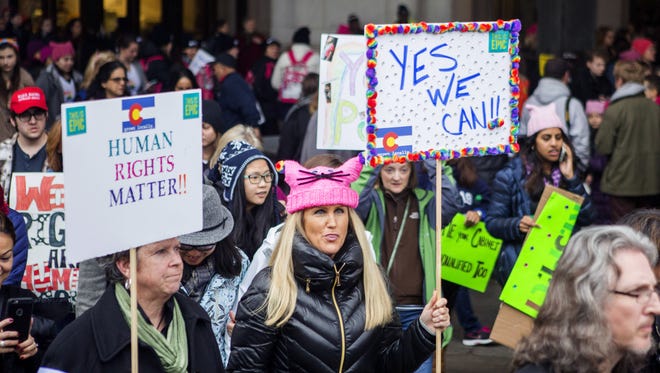Mills: Why we protest
Already there’s too much shrugging at things that used to be totally beyond the pale.

This weekend, I drove out to our nation’s capitol to join the Women’s March on Washington the day after Donald Trump was inaugurated as our 45th president.
I knew immediately when the event was announced, shortly after the November election, that I needed to be there. History needs witnesses. More than that, it needs people to actively stand up to voice resistance when things are going in a dangerous direction.
I’m certainly not alone in this. I’ve heard from countless friends and distant acquaintances alike who were either making the trek to D.C. or attending one of the 600-plus sister marches happening across the nation. There is a collective groundswell of the need to stand up and say, “This is not right. This is not who we are.”
Nearly 70 Democratic lawmakers announced they would officially skip Trump’s inauguration on Friday, including Wisconsin Rep. Mark Pocan. It was a protest of Trump’s “alarming and divisive policies, foreign interference in his election and criticism of civil rights icon John Lewis.” Trump shot off an angry tweet directed at Lewis, accusing him of being “all talk, talk, talk.” That would be the same Lewis who marched with Martin Luther King, Jr. and had his head bashed in by police for his troubles, among other things.
Many musical and entertainment acts either refused invites to or dropped out of performing at Trump’s inaugural, too. Even a Bruce Springsteen cover band backed out of playing the event, citing respect for Springsteen himself, who has been a vocal Hillary Clinton supporter.
There’s been much hay made of whether it matters what types of people were willing to perform at Trump’s inauguration. He and his team insist they don’t care that they were lacking any of the big names of inaugurals past. But between that and the massive mobilization of protests across the U.S., there’s no denying that we’re seeing almost unprecedented backlash against a presidency.
I was depressed and angry when George W. Bush won the office (twice), and I protested his illegal push to start the Iraq War, among other things. With Trump, however, the sense of dread is much greater. With Bush, I at least had a sense that he and his team knew how to function in the office, and that his cabinet picks had some sense of and experience with the jobs they were up for. I also had no reason to believe Bush was likely to be colluding with a foreign power keen on undoing the very fabric of European and U.S. society.
It is disconcerting, to say the least, to find myself in a place now where I can say Bush would make a better president than someone, but here we are.
Nothing is normal.
And that’s why I and many others feel compelled to show up and speak out: we can’t let this become normal. Already there’s too much shrugging at things that used to be totally beyond the pale. Trump’s behavior during the campaign would have been enough to sink the candidacy of any prior hopeful.
I know protests alone don’t tend to change the minds of our leaders. They’re crucial, however, as a means of getting like-minded folks together to bolster moral, build coalitions and stoke the fires needed for the long fight ahead. Protest is an essential part of our great democratic experiment. Even the modern tea partiers, with whom I largely disagree, found utility in public protest. It’s our right.
In the case of the Women’s March, my hope is that this is only the beginning of a much-needed national movement to prevent the normalization of undemocratic policies and trends, and to build a stronger sense of community and what we can accomplish for good when we work together for something better.
Emily Mills is a freelance writer who lives in Madison. Twitter: @millbot; Email: emily.mills@outlook.com